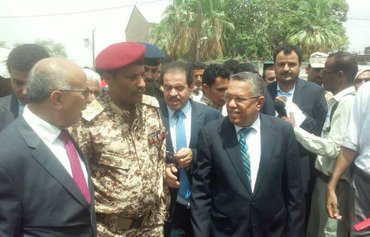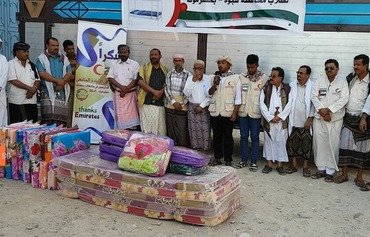The Yemeni government recently formed a committee to prepare a five-year plan for reconstruction in provinces recaptured from the Houthis (Ansarallah).
The plan, funded by $10 billion from Saudi Arabia which has been allocated for reconstruction, will identify and prioritise service and development projects.
Prime Minister Ahmed Obaid bin Dagher has been meeting with executive councils in liberated provinces to identify the most urgently needed projects.
He met with the governor of Shabwa province and members of the executive council on March 6th to discuss the overall security situation and the provision of basic public services.
On February 23rd, the government approved the formation of a committee, headed by the Minister of Planning and International Co-operation with representatives from other ministries, to prepare an urgent five-year plan.
The plan is in line with directives issued by President Abd Rabbu Mansour Hadi to governors to redouble their efforts to solve the problems faced by the public.
The government will provide public services and identify necessary development projects, based on Saudi Arabia’s allocation of funds, which includes a Central Bank deposit to shore up the Yemeni riyal , local media reported.
During a February 23rd cabinet meeting attended by the governors of liberated provinces, bin Dagher said Hadi’s directives require general objectives to be drafted for the upcoming period based on a comprehensive vision.
This will encompass electricity, education, health, water, roads, telecommunications and comprehensive urban and rural development, he said.
The plans must include social and cultural dimensions that aim to alleviate poverty and destitution and promote the values of tolerance, rejection of violence and renunciation of terrorism, local media reported.
Boosting development
Shabwa deputy governor Nasser al-Qamishi told Al-Mashareq that bin Dagher met with provincial officials to obtain directives on the implementation of urgent projects and to identify projects that would help to foster development .
Areas affected by violence and terrorism "have priority in the identification of various needed projects that promote the values of national loyalty and rejection of violence and extremism", he said.
The meetings facilitated urgent projects in the areas of electricity, health, water, education and infrastructure, he added.
The prime minister "issued a directive for adding 10 megawatts of electricity to cope with the upcoming hot summer months, in view of the huge shortfall in electricity", he said.
This is because the Shabwa power plant is producing only 14 megawatts and the Bihan plant only 2 megawatts, he explained.
As for the health sector, the province needs "immediate intervention to fight cholera and pay the salaries of doctors on contract from Shabwa and outside the province", al-Qamishi said.
An 'important step'
The formation of a committee to develop a five-year plan for the implementation of projects "is an important step", economist Abdul Jalil Hassan told Al-Mashareq.
The government "would not take such a step without assurances that the funds allocated for reconstruction are about to be deposited at the Central Bank", he said.
The government is working on two tracks, he said; to identify the projects needed most urgently in the provinces by holding meetings with governors, and through the newly formed committee, which is working on the five-year plan.
The plan will identify necessary development projects in various areas to be implemented in an integrated manner with neighbouring provinces, he said.
The projects chosen for implementation must be "in accordance with a unified economic vision for all development sectors and the needs of citizens", said Studies and Economic Media Centre chairman Mustafa Nasr.
It will be important for local councils in the provinces to conduct "field studies to develop a list of projects needed by the citizens in the areas of health care, education, water, electricity and other services sectors", he said.
These should be "approved locally and implemented centrally, and not the other way around", he said.

![Prime Minister Ahmed Obeid bin Dagher meets with the governor and the executive council of Shabwa province. [Photo courtesy of Yemen News Agency]](/cnmi_am/images/2017/03/16/7443-Yemen-Shabwa-government-600_384.jpg)






I would like to take part in rebuilding Yemen, particularly with electrification.
Reply3 Comment(s)
There is darkness and drinking water disruption in Sanaa and Saada since September 2014. There have been collapses, mass exoduses, escapes, thousands killed and wounded among the pro-Iran al-Houthi militias and the militias of the family of the ousted Sanhan Affash. Al-Qaeda and ISIL are also collapsing with the loss of their key ally, i.e. the family of al-Houthi and that of the ousted Affash. The rockets of Yemeni qat and Iranian hashish are not intimidating anyone; rather, they make those lunatics, ignorant people and drunkards happy!
Reply3 Comment(s)
The pure blood of the martyrs of the Arab Coalition, Yemeni legitimate forces and the courageous popular Yemeni resistance will not go in vain. The gangs of the pro-Iran al-Houthi and the gangs of the ousted al-Sanhani Affash, al-Qaeda and ISIL continue to kill, steal, and loot. More than US$ 5b and more than 400b Yemeni riyals have been stolen by the gangs of the pro-Iran al-Houthi and the gangs of the ousted al-Sanhani Affash, al-Qaeda and ISIL from the Central Bank of Yemen in Sanaa, Saada, al-Hodeidah and Taiz. They have been behind the poverty, hunger and disease of millions of people in northern Yemen.
Reply3 Comment(s)